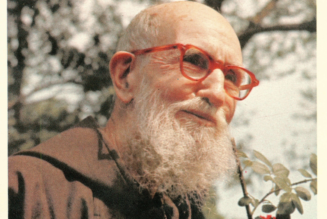
The Diocese of Amarillo assigned Frank Pavone and other Priests for Life employees to sexual harassment and “safe environment” training in 2010, after it received reports accusing the priest of misconduct toward young female subordinates.
Two women who filed such reports say the training was not enough, and the diocese should have done more to look into their allegations against Pavone, who was at that time a cleric incardinated in the Amarillo diocese.
For his part, a spokesperson for Priests for Life told The Pillar this week that “false accusations” against Pavone are “unfortunate,” and that Priests for Life remains committed to its pro-life work.
—
Mary Worthington is a former employee of Priests for Life, who told The Pillar last month that she was frequently sexually harassed and groped by Pavone during the two years she worked at the organization, from 2004 until 2006. She detailed allegations that Pavone frequently touched or groped her legs, buttocks, back, and hair, without her consent.
He also required her to work in his private quarters, she said, and made sexual advances toward her.
Worthington reported the misconduct to the Amarillo diocese in 2009. She told The Pillar that after the report, she “got a phone call back from a deacon in the diocese,” but spoke with him only briefly.
“He asked if [Pavone] ever put his hands under my clothing, and if I was a minor when it happened. And he just said that I was of age, and that was pretty much it,” Worthington alleged. She said she did not hear more about how the diocese handled allegations against Pavone.
Worthington did not keep a copy of her report. But before she spoke with The Pillar last month, she contacted the Amarillo diocese, to request a copy of the allegations she had made.
The diocese said last month it could not give her a copy of that report.
Worthington received a letter from the Amarillo diocese dated Feb. 8 – the same day a report about her allegations was published in The Pillar.
“Please be advised that Bishop Patrick J. Zurek and the Diocese of Amarillo are unable to comply with your request for certain documents that are contained in the personnel file of Frank Pavone,” the letter explained.
“Upon review of your request by the Diocesan Attorney, he advised that all such documents are considered confidential under Texas law, and are not subject to non-judicial release.”
The letter was signed by Deacon Blaine Westlake, director of the safe environment office in the Amarillo diocese.
In addition to declining Worthington’s request, the letter claimed that in 2010, “sexual harassment, safe environment training, and criminal background checks were conducted for all staff and Rev. Pavone.”
Worthington said she was surprised the diocese had assigned Pavone sexual harassment training without a thorough review of complaints against him.
She said the Amarillo diocese should have done more investigation before assuming the allegations could be resolved with a training session.
“They just stuck him in a training? That shows they didn’t take us seriously,” Worthington said. “It shows we have a true problem with chastity in our culture if our priests act like this and have absolutely no consequence.”
“As soon as I left Priests for Life, people would ask me how it was, and I would say that that man needed to be locked up in a monastery and not allowed out, and he needed to be doing penance for the rest of his life.”
“It’s insufficient. I mean, the Church’s sexual harassment training is usually inadequate, but in this case, the diocese didn’t even really talk to me or this other woman – both of us made very detailed reports – or anyone else, to really find out what had happened,” she added.
“I don’t know what it looks like in a totally ‘woke’ company where it’s like, if you look at somebody the wrong way from across the room, it’s considered sexual harassment. But there has to be some level of respect men are expected to have toward women when it comes to any interaction.”
Worthington said she was especially discouraged because in 2011, Pavone was assigned to live in a convent of religious sisters, the Disciples of the Lord Jesus Christ, outside Amarillo.
“You have two women complaining of his unwanted touching and advances. And both of us had been in religious life. And instead of taking us seriously, you remove him from pro-life work over other issues, and make him live with a religious community of women. How does that make sense?”
—
Also surprised was the woman who told The Pillar in January that Pavone had inappropriately touched her, groomed her, and made unwanted sexual advances toward her when she was a young assistant at Priests for Life in the late 1990s, while she was taking a break from undergraduate studies — and shortly before she entered religious life.
Like Worthington, that woman also filed a report with the Amarillo diocese.
Her 2009 report, a copy of which was obtained by The Pillar, alleged that Pavone would rub her back, apparently unhooking her bra, and stroke her hair— and that he made an unwanted visit to her hotel room during a Priests for Life trip, during which he allegedly sexually propositioned her.
During her employment at Priests for Life, Pavone began to call her a “spiritual daughter,” and urged her to call him “Dad,” the woman alleges.
The report also details a disturbing incident which allegedly occurred shortly before the woman entered religious life in 2001. During that incident, Pavone reportedly took the woman to his private quarters, after “pressuring her to let him comb her hair before she cut it off to join the convent.”
In his living area, Pavone allegedly urged the woman to sit on his bed, but when she declined and sat at his dining table, “he began to comb her hair. She said it was very painful, and he said he had never had a sister. [The woman] took out a brush to make it less painful. He then played with her hair some more. She cannot remember what happened after that. She does remember that Father was angry, short, distant, and temperamental when he dropped her off at the flat,” according to her report.
After she reported Pavone’s misconduct to the Amarillo diocese, the woman said she spoke briefly with a diocesan employee, and had a 20-minute conversation with Amarillo’s Bishop Zurek.
She learned this week that Pavone had been assigned to undergo sexual harassment training in 2010, after the Amarillo diocese had received both her report and Worthington’s.
“That is not sufficient” to prevent future misconduct, the woman told The Pillar.
“I wasn’t made aware of anything that would prevent it from continuing to happen,” she told The Pillar.
The woman noted that Fr. Stephen Imbarrato, a Priests for Life staffer from 2015 to 2018, has said recently that he had counseled a women who allegedly experienced sexual harassment well after Pavone’s mandatory harassment training.
“Clearly this continued to happen,” she said. So “I don’t think that’s sufficient, if that was the final word on these things.”
“There should have been a much more in-depth investigation. I can’t speak for what they did behind the scenes, but no one asked me for more details of any kind. The fact that none of that was asked for or documented … I was, just, kind of, you know, persona non grata after we made the report,” she added.
“I hear people ask why we’re still talking about this. That it was 20 years ago in my case, old news. And to some extent that’s what Frank Pavone himself has said, right? That these things were dealt with in the past. Well, I don’t know how they were dealt with, but I wasn’t part of the dealing with it.”
She noted the damage Pavone’s alleged behavior has had on her life.
“This isn’t something that happens and then goes away. This is something that haunts you. However people experience this, there’s long-term damage. The people who experienced grooming, harassing behaviors, or outright abuse in these situations are not going to be better quickly. They may heal to a certain extent, but they’re going to carry this, and some of them will be profoundly affected.”
“I continue to be profoundly affected by this. My family continues to be profoundly affected. My children continue to be profoundly affected. My relationship with the Church continues to be profoundly affected.”
In addition to that woman, Worthington, and the woman mentioned by Imbaratto, the Pillar has confirmed that other women have made reports about Pavone’s alleged sexual harassment and misconduct to the Amarillo diocese. And journalist Jenn Morson wrote in America magazine last month that during her employment at Priests for Life in the late 1990s, she was subject to grooming and boundary violations, as Pavone “create[d] the sort of atmosphere where abuse thrives.”
In the years before Pope Francis promulgated Vos estis lux mundi in response to the Theodore McCarrick scandal, clerical sexual misconduct involving adults was usually treated in the Church as a moral failing, but not a canonical crime — even if the cleric had a relationship of supervisory or spiritual authority over the other involved party.
The Vatican has in recent years revised canon law to broaden prohibitions on clerical sexual misconduct against adults, but experts have said the Church continues to insufficiently address the charge of sexual coercion, manipulation and harassment of adults.
But even before the Church’s law was changed, canon law provided that “a cleric who persists with scandal in another external sin against the sixth commandment of the Decalogue is to be punished by a suspension. If he persists in the delict after a warning, other penalties can gradually be added, including dismissal from the clerical state.”
—
For Pavone’s part, a Priests for Life spokesperson, Leslie Palma, told The Pillar this week that “the false accusations and vitriol of recent statements are truly unfortunate.”
The Pillar asked whether Pavone and Priests for Life maintained that the women who have made reports about Pavone are guilty of making “false accusations.”
In response, Palma reiterated previous statements, telling The Pillar that “these stories are filled with many inaccuracies, mistruths, and hurtful insinuations. Further, these claims were already investigated by the Church more than a decade ago, with Father Frank found in good standing and fully suited for ministry.”
Both Worthington and the other woman who spoke with The Pillar emphasized that whatever investigation was undertaken by the diocese did not involve them.
Worthington said that omission is an injustice to other women who suffered Pavone’s misconduct after she filed her report in 2009.
And she said that while Pavone has defended himself, “there’s no remorse on Pavone’s side at all.”
“He has no remorse at all. And what about the salvation of his soul, if he won’t repent?”
The Amarillo diocese has not responded to phone calls and messages from The Pillar.
Pavone’s laicization became public late last year, after a letter to U.S. bishops from apostolic nuncio Archbishop Christophe Pierre was published online Dec. 17.
In the Dec. 13 letter, Pierre noted that Pavone is a longtime high-profile figure associated with the right-to-life movement, adding that his laicization “may, therefore, be a matter of interest among the faithful.”
In light of that “potential interest,” the nuncio sent to the bishops a brief statement from the Vatican’s Dicastery for Clergy, which said Pavone had been laicized after “canonical proceedings” found him guilty of “blasphemous communications on social media, and of persistent disobedience of lawful instructions from his diocesan bishop.”
The Vatican’s statement said that Pavone had been given “ample opportunity” to defend himself, and was given several chances to accept his bishop’s authority but had not done so and had given “no reasonable justification for his actions.”
While both Pavone and some supporters have suggested his laicization was a kind of political persecution because of the former cleric’s pro-life convictions, a 2017 letter to Pavone from Bishop Zurek alleges a broad pattern of disobedience.
After his laicization, Pavone remains the national director of Priests for Life, a national pro-life apostolate, which in turn supports Rachel’s Vineyard post-abortion healing retreats, manages a publishing division, engages in television production work, and livestreams daily Masses.
Since 2016, Pavone has posted tweets, Facebook statuses, videos, and other social media postings urging support for the Republican party, calling into question the validity of the 2020 presidential election, and disparaging Democratic lawmakers. Pavone served as a member of the campaign advisory group “Catholics for Trump” during the election.
Pavone was ordained a priest by Cardinal John O’Connor of New York in 1988, and has served in pro-life leadership positions full-time since 1993, when he became the director of Priests for Life.
Originally incardinated in the Archdiocese of New York, the priest transferred his incardination to the Diocese of Amarillo, Texas in 2005, with plans to begin a religious order. The plan fizzled, and Pavone soon found himself clashing with Amarillo’s Bishop Patrick Zurek, who was appointed to lead the diocese three years after Pavone arrived there.
During his years of as a cleric, Pavone frequently argued that he had a vocation-within-a-vocation, a discerned divine calling to dedicate his priesthood to abortion-specific ministry.
Pavone has argued since his laicization that his particular vocation to pro-life work justified his reluctance to accept other assignments, and claimed that his issues in the Church have stemmed from unsupportive bishops, especially Zurek.
In recent weeks, Pavone has said frequently he can be eventually reinstated as a cleric by a future pope.
—
Worthington told The Pillar she was incredulous that the Amarillo diocese said last month she could not be given a copy of a report she had filed in 2009.
“You’ve gotta be kidding me. What even is that?”
“It shows that this diocese is not concerned at all about victims — It’s not like they’re trying to protect Pavone; they were happy to laicize Pavone, so it’s not like they want to protect him. So what is it? Is it to cover their own insufficient treatment of all of this, because they know they didn’t really deal with what we told them?”
The Amarillo diocese did not respond to requests for comment from The Pillar, nor comment on what provisions of Texas law would impede it from returning to Worthington a copy of the report she filed.
For her part, Worthington said it shows that “they’re not even interested in taking care of victims. I just hope and pray that there is not someone out there who suffered something much worse than me, who is now looking for justice, because they’re not going to find it in the Diocese of Amarillo.”
Worthington lamented that she had not been able to speak with Amarillo’s Bishop Zurek about her experience.
“You hear all these things now about ‘the elite’ or the 1% or whatever. Well, our bishops are doing a very good job of trying to be that way. Bishops are supposed to be like the bishop who just got murdered, out there walking among their people, and talking with them, and being with them — instead of in their offices, hiding behind stacks of paper, without even a way to be contacted listed on their website. What even is that?”
The other woman who filed a complaint in Amarillo told The Pillar that she hopes there is some possibility for “further reconciliation and healing between the Diocese of Amarillo and Frank Pavone’s victims.”
“There could be, if both sides are open to it.”
The woman said she understands that dioceses are not always sure how best to address reports against priests, but she said “there’s room for both justice and truth to be served, as well as mercy.”
Still, the woman said that the handling of complaints against Pavone indicates a long-standing bias against victims in the culture of the Church.
“For a long time in the Church, victims were sort of viewed through the lens of being a threat or a danger to the Church. Because victims might sue, or there might be a public uproar if this was in the press, and that sort of thing might be cause for scandal… A lot of the times when a victim would show up, the [institutional] focus was on defense, as if the victim was opposed to the diocese and opposed to the Church. And therefore, opposed to the body of Christ, and Christ himself. And we’re not the enemy.”
“So I am hoping that moving forward, we can learn as a Church, and as members of the body of Christ, how to handle these situations with greater justice, greater charity, to result in a greater healing for all parties involved, and for the salvation of souls. Ultimately, I think that’s what it comes down to.”








